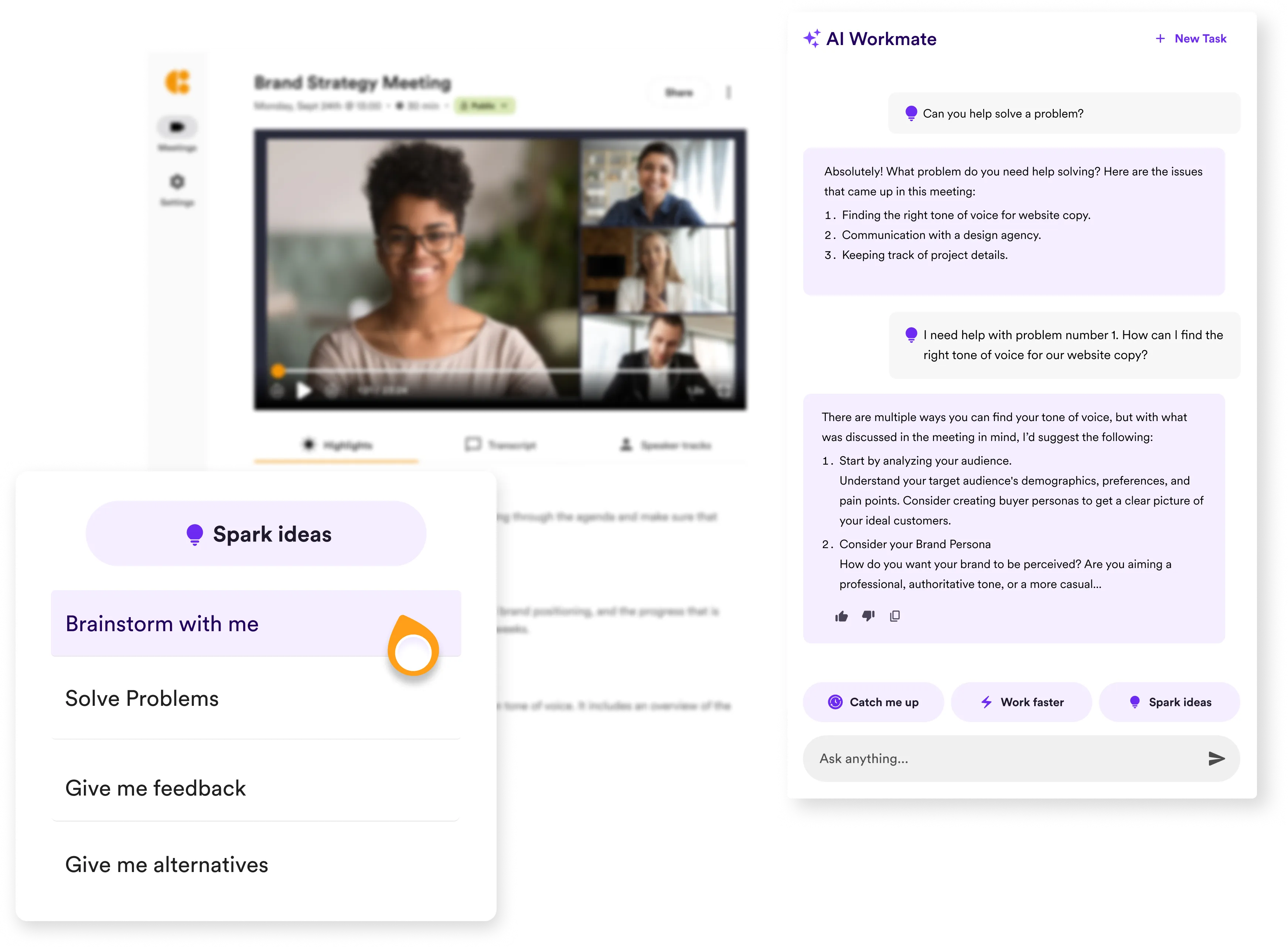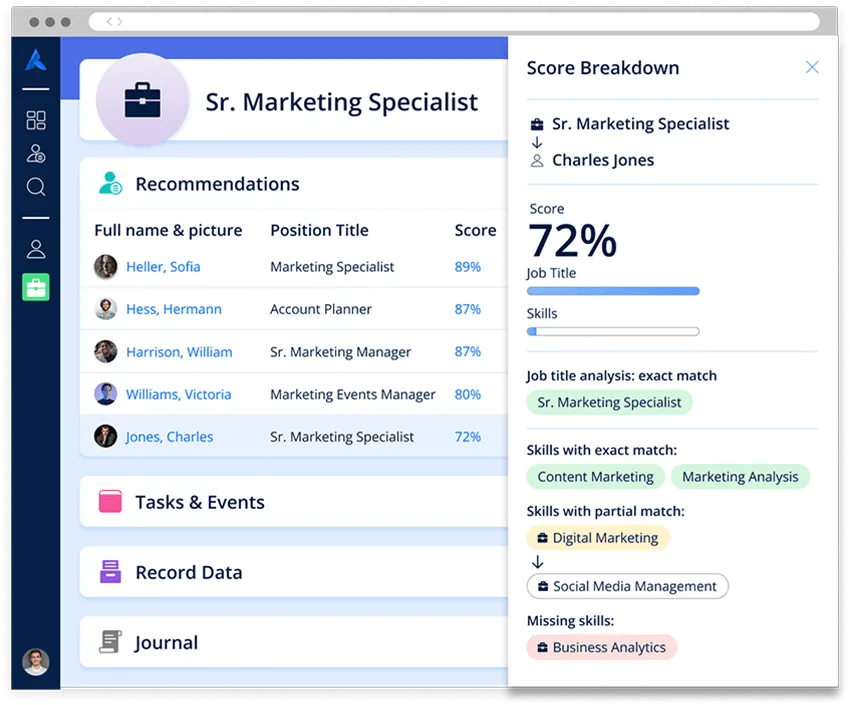Structured Interview : Example and Questions

As a recruiter, you know that finding the perfect candidate is not just a matter of intuition but of a reflexive approach.
Hhow can you ensure that every candidate has a fair chance to shine, while at the same time making an objective and relevant analysis of their skills?
The answer lies in structured interviews.
In this article, we delve into the heart of this method, exploring its benefits, and the ways in which it can be implemented.
Why You Should Structure All Your Interviews
Relying too much on casual, unstructured interviews? While these might seem more relaxed and personal, they often lead to inconsistencies in how candidates are assessed.
Structured interviews have been proven to be the most accurate and fair recruitment approach. Here are four reasons why :
Uniformity
In a structured interview, you ask each candidate the same set of questions in the same order. This uniformity is crucial.
It prevents the pitfalls of improvisation and inconsistency, which are common in more casual settings.
Imagine this: two candidates, equally qualified, but asked different questions. How can you fairly compare their responses? Structured interviews eliminate this issue, ensuring every candidate has the same opportunity to showcase their abilities.
Moreover, structured interviews can save you time—up to 25% less time spent per interview according to some studies. That's not just efficient; it's also a smarter use of your resources.
Objectivity
Each candidate in a structured interview is evaluated against the same criteria. This method significantly reduces personal bias.
We all have subconscious preferences that can influence our judgment. In a traditional interview, these biases might lead you to favor a candidate not because they are the best fit for the job but because they share your interests or have a similar personality.
Structured interviews keep the focus on the candidate’s qualifications and their answers to your pre-set questions. This way, your hiring decision is based more on relevant job skills and less on personal affinity.
Equity
Structured interviews provide all candidates with an equal playing field. In less formal interviews, the conversation might veer off into topics not relevant to the job, potentially disadvantaging those who are less skilled in informal banter.
By asking the same questions in the same setting, you ensure that every candidate has a fair chance to demonstrate their suitability for the position.
Accuracy
Finally, structured interviews are simply more accurate. They allow you to precisely measure and compare the abilities of different candidates. This is because each response can be directly compared to others, based on the same question and criteria.
Switching to structured interviews doesn't just help you hire the right person for the job—it also streamlines your entire recruitment process, making it quicker, more reliable, and fairer. With these benefits, it’s clear why moving away from “gut-feeling” interviews is a strategic choice for any organization focused on enhancing its recruitment outcomes.
Tips for Conducting a Structured Interview

As its name suggests, structured interviews involve adopting a rigorous, well-defined process that avoids disgressions and improvisation.
Here's how to set it up in 5 steps:
1. Identifying Key Skills
The first step is crucial: gather your recruiting team and managers to pinpoint the key skills required for the position.
Start by listing the technical or "hard" skills necessary for the job. Are you looking for a top-notch strategist or a natural communicator? Perhaps both? Analyze the job description to determine the essential skills, both technical and behavioral. For example, a developer might need strong coding skills and the ability to work collaboratively in a team setting.
Next, consider the "soft" skills. Qualities like creativity, resilience, and teamwork are often just as crucial as technical abilities. After all, you can teach skills, but character traits are usually ingrained.
Once you've identified the necessary skills, prioritize them. Which are critical for day-one performance, and which can be developed over time? This prioritization helps focus your questions on what truly matters for success in the role.
2. Crafting Questions
With your evaluation criteria in hand, it's time to develop your questionnaire—the core of your structured interview. You’ll need to transform your criteria into powerful questions that reveal the true nature of your candidates.
There are two types of questions to prepare:
- Behavioral questions delve into the candidate’s past experiences. For example, if you're looking for someone with excellent conflict resolution skills, you might ask, "Can you describe a time when you had to manage a disagreement within your team? How did you handle it?" Such questions provide a glimpse into how candidates have handled real-world situations.
- Situational questions assess how candidates might handle hypothetical scenarios they could face in the job. For instance, "Imagine you have a project with a tight deadline and limited resources. How would you prioritize your tasks?" This type of question helps you understand a candidate’s reasoning and decision-making process.
By combining these questions, you create a robust framework to assess both past behavior and potential future performance, giving you a comprehensive view of each candidate's capabilities.
3. Developing a Rating Scale
Once your questions are set, establish a rating scale. This is vital for ensuring that the interviews don’t become subjective judgments. Define several possible answers for each question and assign them a score.
For instance, if evaluating project management skills, your scale might range from 1 (poor response, indicating no experience) to 5 (excellent response, indicating significant experience with complex projects).
Each level should have a clear description, so you know exactly what to listen for. This structured approach ensures you assess responses objectively, making your evaluation as fair as possible.
4. Conducting the Interview
Now it’s time to bring your preparation to life. Start each interview by setting the right tone—be welcoming and professional. A firm handshake, a warm smile, and a friendly greeting can make all the difference. Ensure the candidate is comfortable; a relaxed candidate is more likely to reveal their true self.
Follow your structured guide and ask each question in order. However, remain attentive to the candidate's responses. Active listening is key. If a response intrigues you or feels incomplete, don’t hesitate to probe deeper. Think of yourself as a detective seeking clues—each answer could unveil a critical aspect of the candidate’s suitability for the role.
Remember to take detailed notes, not just on what the candidates say but how they say it. Non-verbal cues can be just as telling as the spoken word.
5. Reviewing and Decision Making
After the interview, take time to review your notes and evaluate each response using your rating scale. Like a judge in a talent show, be precise, fair, and objective. Assess each answer based on how well it matches the established criteria.
Compile your evaluations to compare candidates effectively. This might involve creating a summary table or chart that clearly shows each candidate's strengths and weaknesses based on the predefined criteria.
Finally, before making your decision, consider the candidate's overall profile—their experience, skills, and personality—and how they fit within your company's culture.
By carefully following these steps, you ensure your structured interviews are not only effective but also instrumental in making the best hiring decisions for your company.
Examples of Structured Interview Questions

Having a hard time formulating fair and effective questions in a structured interview ? Below, you'll find ten examples each of behavioral and situational questions :
Behavioral Questions
Behavioral questions aim to reveal how a candidate has handled real-life situations in the past, based on the premise that past behavior is a good predictor of future behavior. Here are ten behavioral questions you can use:
- Adaptability: Describe a time when you had to work closely with someone whose personality was very different from yours.
- Project Management: Tell me about a project that you planned. How did you organize and schedule the tasks?
- Accountability: Can you give me an example of a time you made a mistake? How did you handle it?
- Decision-Making: Discuss an instance when you had to make a decision without all the information you needed.
- Conflict Resolution: Describe a situation where you had to deal with a difficult client or customer.
- Goal Achievement: Give an example of a goal you reached and tell me how you achieved it.
- Independence: Tell me about a time when you worked under close supervision or extremely loose supervision.
- Commitment: Describe a time when you had to go above and beyond the call of duty to get a job done.
- Prioritization: Give me an example of a time you had to prioritize multiple projects.
- Written Communication: Tell me about a time when you had to rely on written communication to get your ideas across to your team.
Situational Questions
Situational questions help you understand how a candidate might handle hypothetical job-related scenarios. These questions are crafted to gauge a candidate’s reasoning, problem-solving abilities, and future performance in specific situations.
- Problem-Solving: Imagine you are working on a tight deadline but waiting on information from a coworker. What steps would you take?
- Leadership: If you noticed that your team's morale was low, what actions would you take to boost it?
- Integrity: Suppose you find a significant error in a project that has already been distributed to the client. What would you do?
- Time Management: Imagine that you have conflicting deadlines. How would you decide which assignment to prioritize?
- Learning Agility: If given a new project in an area you are unfamiliar with, how would you proceed?
- Conflict Resolution: How would you handle a situation where you disagreed with your manager’s instructions?
- Team Management: Suppose you have a team member who is not pulling their weight. What would you do?
- Change Management: Imagine you are tasked with implementing a change that you do not agree with. How would you handle it?
- Interpersonal Skills: What steps would you take if you were assigned to work with a team member you found difficult to work with?
- Innovation: If you discovered a process that could be significantly improved, but it would disrupt current procedures, how would you handle it?
Leveraging AI for Structured Interviews: Noota

Looking to streamline your structured interviews? Noota not only remind of your questions during the interview but also track your candidate's every response :
- Reminder Feature: Ever forget to ask a crucial question during an interview? With Noota, that’s a thing of the past. It acts like an integrated cheat sheet, ensuring you cover all essential aspects of the interview. This ensures consistency and comprehensiveness in every interview you conduct.
- Response Tracking: Noota meticulously records and analyzes each response. You don’t have to worry about missing important details or mixing up responses from different candidates. Everything is neatly organized and easily accessible, allowing for thorough and accurate evaluations.
- Detailed Reporting: After the interview, Noota provides a detailed report highlighting the candidate’s strengths and areas for improvement. This feature helps you make more informed decisions by clearly outlining how each candidate matches up against the job requirements.
- Enhanced Objectivity: By standardizing the follow-up and reporting processes, Noota helps eliminate personal bias, ensuring a fairer and more objective evaluation. Each candidate is assessed purely on their merits, based on the structured criteria you’ve set.
Want to automatically structure your interviews ? Try Noota for free now.
Leverage your Interview Data
AI interview notes, scorecard, follow-up, ATS integration, and more...
Related articles

Forget note-taking and
try Noota now
FAQ
In the first case, you can directly activate recording as soon as you join a videoconference.
In the second case, you can add a bot to your videoconference, which will record everything.
Noota also enables you to translate your files into over 30 languages.

.svg)
.svg)
.webp)

.png)


.svg)
